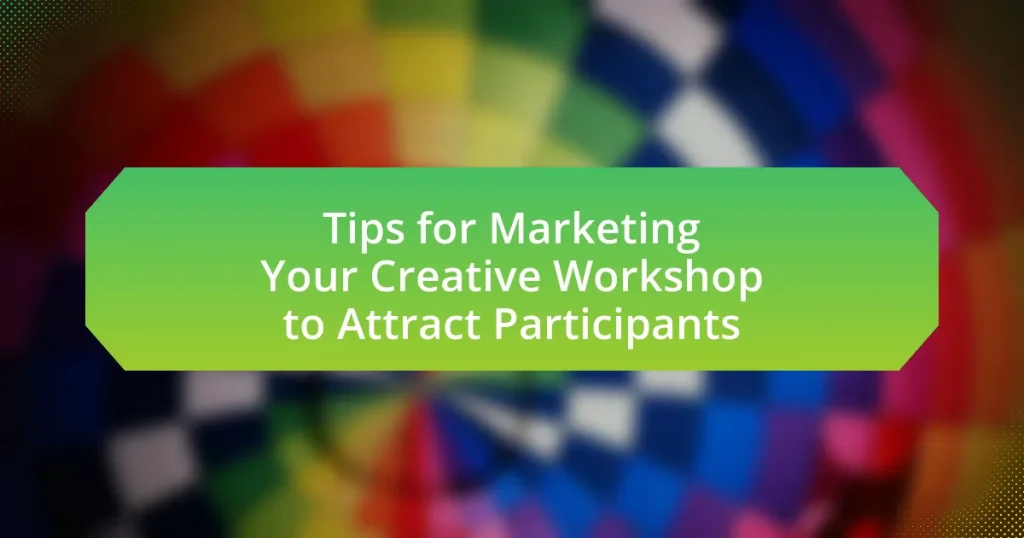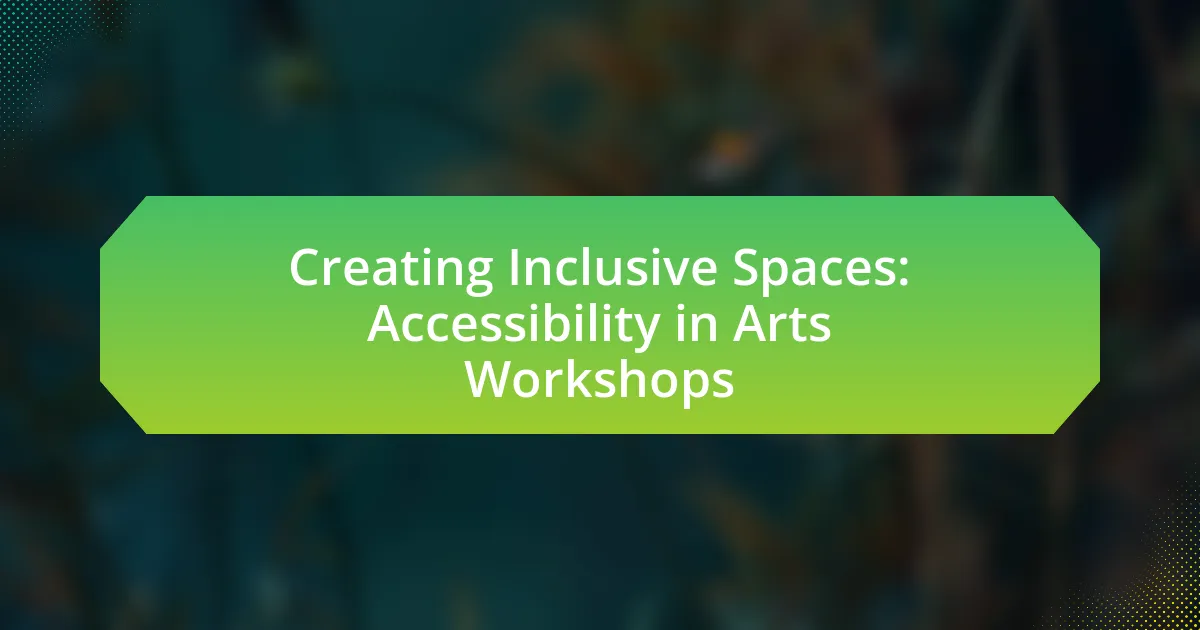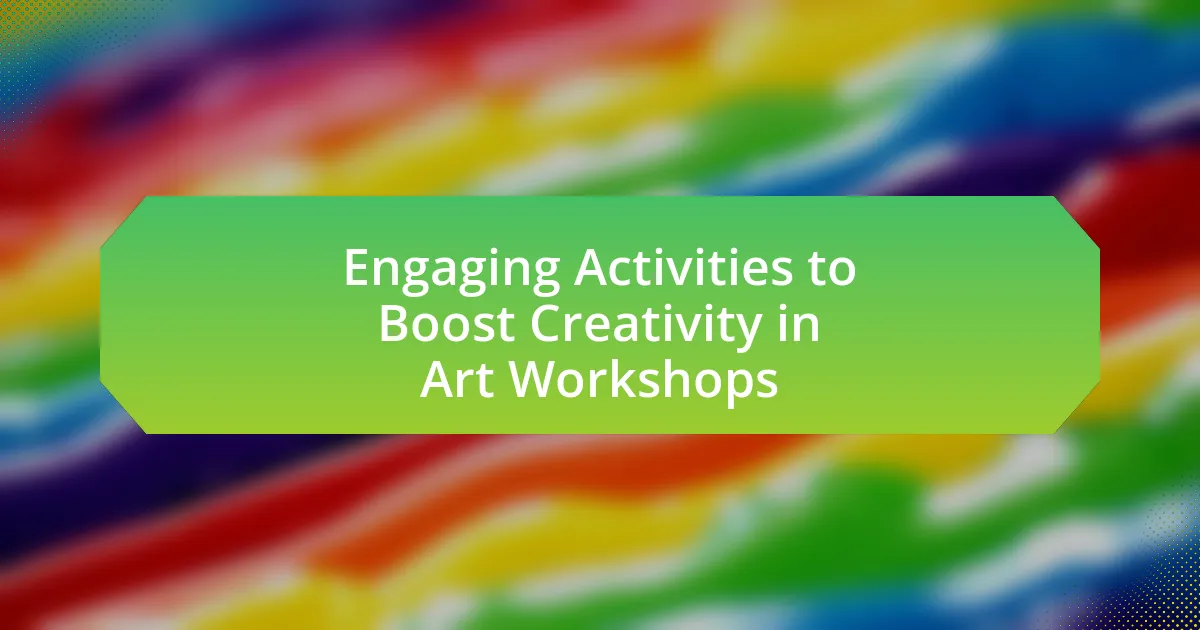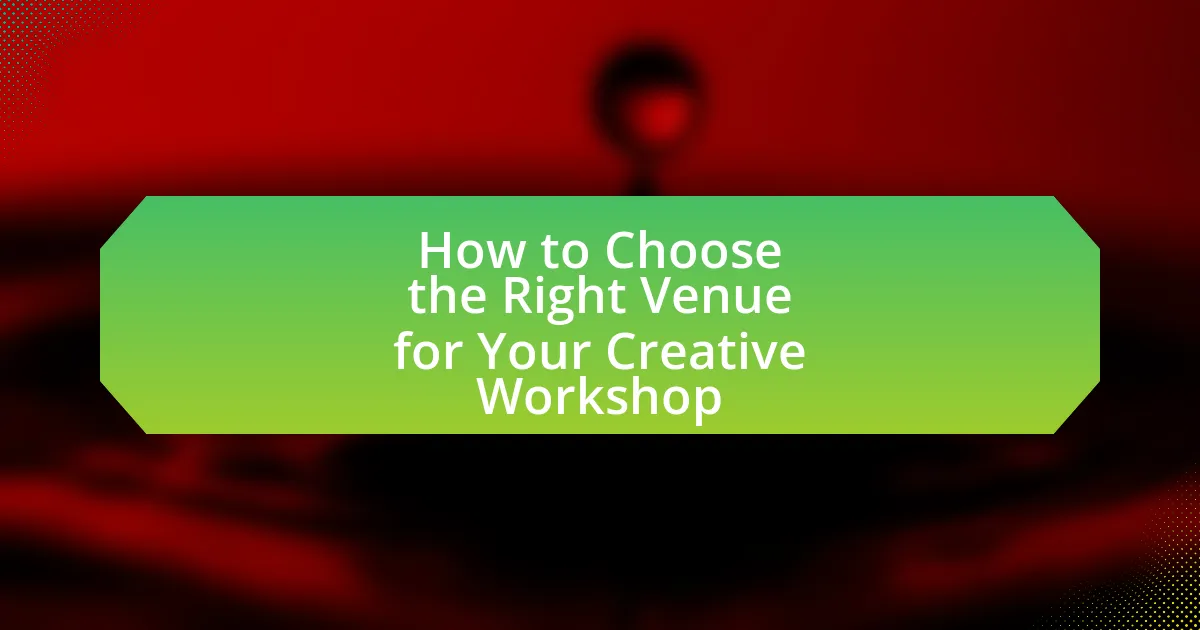The article focuses on effective strategies for marketing creative workshops to attract participants. It outlines key methods such as leveraging social media, utilizing email marketing, and collaborating with influencers to enhance visibility and engagement. The article emphasizes the importance of identifying target audiences through market research and tailoring content to their interests and demographics. Additionally, it discusses the significance of branding, creating engaging content, and employing effective pricing strategies to maximize attendance. Best practices for participant engagement before, during, and after the workshop are also highlighted, along with metrics for measuring marketing success.
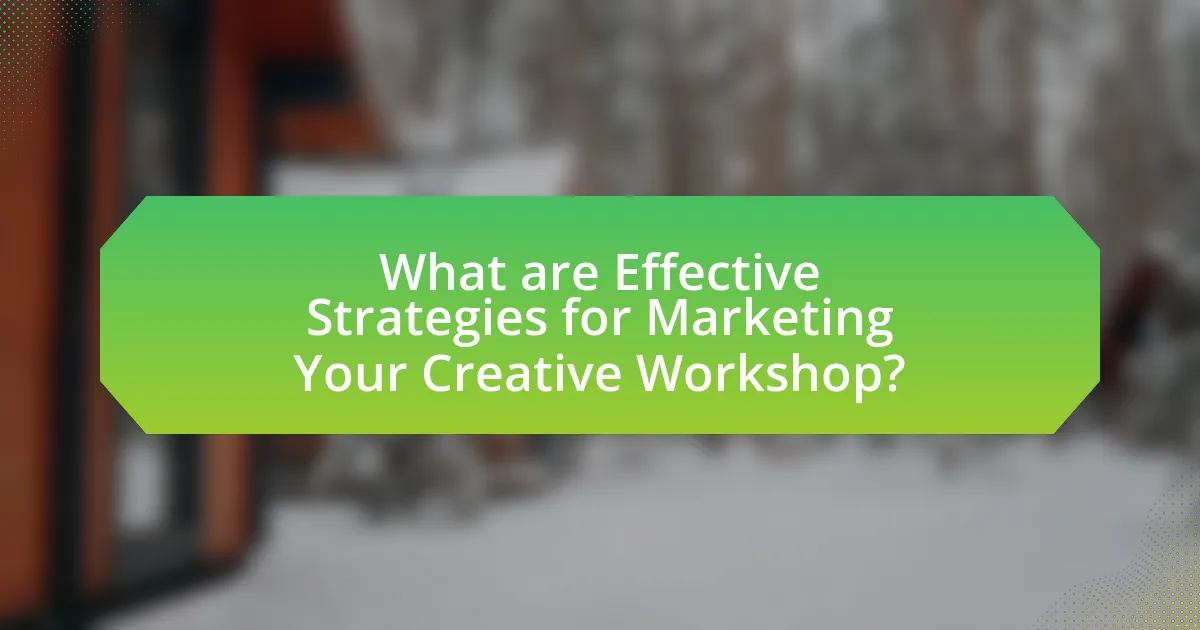
What are Effective Strategies for Marketing Your Creative Workshop?
Effective strategies for marketing your creative workshop include leveraging social media platforms, utilizing email marketing, and collaborating with influencers in your niche. Social media platforms like Instagram and Facebook allow for targeted advertising, reaching specific demographics interested in creative activities. Email marketing can effectively engage past participants and potential attendees by providing updates, exclusive offers, and personalized content. Collaborating with influencers can expand your reach, as they can promote your workshop to their established audience, increasing visibility and credibility. According to a study by HubSpot, businesses that prioritize blogging are 13 times more likely to see a positive ROI, highlighting the importance of content marketing in attracting participants.
How can you identify your target audience for the workshop?
To identify your target audience for the workshop, conduct thorough market research to understand the demographics, interests, and needs of potential participants. This involves analyzing data from surveys, social media insights, and industry trends to pinpoint who would benefit most from your workshop. For instance, if your workshop focuses on digital marketing, your target audience may include small business owners, marketing professionals, or students in related fields. Research indicates that 70% of successful workshops tailor their content to specific audience segments, enhancing engagement and participation rates.
What demographics should you consider when defining your audience?
When defining your audience for a creative workshop, consider demographics such as age, gender, income level, education, and geographic location. These factors influence participants’ interests, availability, and ability to pay for workshops. For instance, a study by the Pew Research Center indicates that younger adults, particularly those aged 18-34, are more likely to engage in creative activities, while income levels can determine the affordability of workshop fees. Understanding these demographics allows for targeted marketing strategies that resonate with potential participants, ultimately increasing attendance and engagement.
How can audience interests shape your marketing approach?
Audience interests can significantly shape your marketing approach by guiding the content, channels, and messaging used to engage potential participants. Understanding what your audience values allows marketers to tailor their strategies to resonate with those interests, increasing the likelihood of attracting participants. For instance, if research indicates that your target audience is interested in sustainability, incorporating eco-friendly practices into your workshop and highlighting them in your marketing materials can enhance appeal. Additionally, utilizing platforms where your audience is most active, such as social media or community forums, ensures that your marketing efforts reach the right people effectively.
What marketing channels are most effective for promoting workshops?
Social media platforms are the most effective marketing channels for promoting workshops. They allow for targeted advertising, community engagement, and sharing of visual content, which is crucial for attracting participants. According to a study by HubSpot, 73% of marketers believe that their efforts through social media marketing have been “somewhat effective” or “very effective” for their business. Additionally, platforms like Facebook and Instagram enable event promotion through features like event pages and targeted ads, reaching specific demographics interested in workshops. Email marketing also remains a strong channel, with a return on investment of $42 for every dollar spent, as reported by the Data and Marketing Association. This combination of social media and email marketing creates a robust strategy for effectively promoting workshops.
How can social media platforms be utilized for workshop promotion?
Social media platforms can be utilized for workshop promotion by creating targeted advertisements, engaging content, and community interactions. Targeted advertisements on platforms like Facebook and Instagram allow organizers to reach specific demographics, increasing visibility among potential participants. Engaging content, such as videos, infographics, and testimonials, can capture attention and encourage shares, further expanding reach. Additionally, community interactions through posts, comments, and live sessions foster a sense of connection and urgency, motivating users to register. According to a 2021 report by Hootsuite, 54% of social media users utilize these platforms for discovering events, highlighting their effectiveness in workshop promotion.
What role do email marketing campaigns play in attracting participants?
Email marketing campaigns play a crucial role in attracting participants by directly engaging potential attendees through targeted communication. These campaigns allow organizers to share information about the workshop, highlight its benefits, and create a sense of urgency through limited-time offers or early-bird registration discounts. According to a study by the Direct Marketing Association, email marketing has an average return on investment of $42 for every dollar spent, demonstrating its effectiveness in reaching and converting interested individuals into participants.
Why is branding important for your creative workshop?
Branding is important for your creative workshop because it establishes a unique identity that differentiates your workshop from competitors. A strong brand communicates the values, mission, and quality of your workshop, making it more recognizable and memorable to potential participants. Research shows that consistent branding can increase revenue by up to 23% (Lucidpress, 2019), highlighting its effectiveness in attracting and retaining customers. By creating a cohesive brand image, you foster trust and loyalty, encouraging participants to choose your workshop over others.
How can a strong brand identity enhance your workshop’s appeal?
A strong brand identity enhances your workshop’s appeal by creating a memorable and recognizable image that resonates with potential participants. This distinct identity fosters trust and credibility, making individuals more likely to engage with your workshop. Research indicates that 77% of consumers make purchases based on brand recognition, highlighting the importance of a cohesive brand identity in attracting attendees. Furthermore, a well-defined brand identity communicates the values and unique offerings of your workshop, differentiating it from competitors and appealing to your target audience’s preferences.
What elements contribute to effective branding for workshops?
Effective branding for workshops involves a clear value proposition, consistent visual identity, and targeted messaging. A clear value proposition communicates the unique benefits and outcomes participants can expect, which is essential for attracting interest. Consistent visual identity, including logos, color schemes, and typography, creates recognition and trust among potential attendees. Targeted messaging ensures that the branding resonates with the specific audience, addressing their needs and interests. Research indicates that consistent branding can increase revenue by up to 23%, highlighting the importance of these elements in effective workshop branding.
How can you create engaging content to attract participants?
To create engaging content that attracts participants, focus on delivering value through informative and relatable material. Engaging content should address the interests and needs of your target audience, utilizing storytelling techniques, visuals, and interactive elements to enhance connection. Research indicates that content that resonates emotionally with audiences can increase engagement rates by up to 60%, as shown in studies by the Content Marketing Institute. By incorporating practical tips, real-life examples, and clear calls to action, you can effectively motivate potential participants to join your workshop.
What types of content resonate most with potential workshop attendees?
Engaging and informative content types that resonate most with potential workshop attendees include instructional videos, testimonials, and interactive social media posts. Instructional videos provide a clear preview of the workshop’s value, showcasing skills or techniques that attendees will learn, which can increase interest and registration. Testimonials from past participants serve as social proof, demonstrating the workshop’s effectiveness and encouraging new attendees to join. Interactive social media posts, such as polls or Q&A sessions, foster community engagement and allow potential attendees to connect with the workshop’s theme, enhancing their likelihood of participation.
How can storytelling be used to promote your workshop effectively?
Storytelling can be used to promote your workshop effectively by creating an emotional connection with potential participants. Engaging narratives about past workshop experiences, participant transformations, or the journey of the workshop creator can resonate deeply with the audience, making them more likely to enroll. Research indicates that stories can increase information retention by up to 65%, as they help to contextualize the workshop’s value and benefits in a relatable manner. By sharing testimonials or case studies that highlight successful outcomes, you can further validate the workshop’s impact, encouraging more individuals to participate.

What are the Best Practices for Engaging Participants Before the Workshop?
To effectively engage participants before a workshop, utilize targeted communication strategies such as personalized emails, social media outreach, and pre-workshop surveys. Personalized emails can increase engagement by 29% according to a study by Experian, as they make participants feel valued and informed. Social media outreach allows for real-time interaction and builds excitement, with 54% of users expressing interest in attending events promoted through these platforms. Pre-workshop surveys gather participant expectations and preferences, fostering a sense of involvement and ensuring the content aligns with their interests. These practices collectively enhance participant engagement and anticipation for the workshop.
How can you build anticipation for your workshop?
To build anticipation for your workshop, create a compelling marketing campaign that highlights unique aspects of the event. Utilize social media platforms to share teasers, such as behind-the-scenes content or participant testimonials, which can generate excitement and engagement. Research shows that 70% of consumers are more likely to attend an event when they see engaging content about it online. Additionally, offering early bird registration discounts can incentivize potential participants to secure their spots, further increasing anticipation.
What pre-workshop activities can enhance participant engagement?
Pre-workshop activities that can enhance participant engagement include sending out pre-workshop surveys to gauge interests and expectations, creating a dedicated online community for participants to interact before the event, and providing pre-reading materials or resources related to the workshop topic. These activities foster a sense of involvement and anticipation, leading to higher engagement levels during the workshop. Research indicates that participants who engage with content prior to an event are more likely to be active contributors, as highlighted in studies on adult learning principles, which emphasize the importance of preparation in enhancing learning outcomes.
How can you leverage testimonials and past participant experiences?
You can leverage testimonials and past participant experiences by prominently displaying them in your marketing materials to build credibility and trust. Testimonials serve as social proof, demonstrating the value and impact of your workshop through real participant feedback. For instance, a study by Nielsen found that 92% of consumers trust recommendations from individuals over brands, highlighting the effectiveness of testimonials in influencing potential participants. Additionally, sharing specific success stories or outcomes from past participants can create an emotional connection and encourage new attendees to enroll, as they can envision similar positive experiences for themselves.
What role does pricing play in attracting participants?
Pricing plays a crucial role in attracting participants by influencing their perception of value and affordability. When workshop prices are set competitively, they can appeal to a broader audience, making the event more accessible. Research indicates that participants often associate lower prices with higher value, especially in creative workshops where budget constraints are common. For instance, a study by the Event Marketing Institute found that 70% of potential attendees consider price as a primary factor in their decision-making process. Therefore, strategically pricing workshops can enhance enrollment rates and ensure a diverse participant base.
How can you determine the right pricing strategy for your workshop?
To determine the right pricing strategy for your workshop, analyze your target audience, competition, and the value you provide. Understanding your audience’s willingness to pay is crucial; surveys or market research can reveal their price sensitivity. Additionally, evaluate competitors’ pricing to position your workshop effectively within the market. Finally, assess the unique benefits and outcomes your workshop offers, as higher perceived value can justify a premium price. This approach aligns with pricing strategies that emphasize value-based pricing, which has been shown to increase customer satisfaction and retention.
What discounts or promotions can incentivize early registration?
Offering tiered discounts for early registration can effectively incentivize participants. For instance, a 20% discount for those who register one month in advance, followed by a 10% discount for registrations made two weeks prior, encourages prompt sign-ups. Research indicates that early bird pricing can increase registration rates by up to 30%, as it creates a sense of urgency and value among potential attendees.

How can you Measure the Success of Your Workshop Marketing Efforts?
To measure the success of your workshop marketing efforts, track key performance indicators (KPIs) such as registration numbers, participant feedback, and engagement metrics. Registration numbers provide a direct measure of interest generated by your marketing strategies, while participant feedback through surveys can reveal satisfaction levels and areas for improvement. Engagement metrics, including social media interactions and website traffic, indicate how effectively your marketing content resonates with your target audience. For instance, a study by Eventbrite found that workshops with higher social media engagement saw a 30% increase in attendance, demonstrating the correlation between marketing efforts and participant turnout.
What metrics should you track to evaluate marketing effectiveness?
To evaluate marketing effectiveness, track metrics such as conversion rate, customer acquisition cost, return on investment (ROI), and engagement rate. Conversion rate measures the percentage of visitors who take a desired action, indicating how well marketing efforts convert interest into participation. Customer acquisition cost calculates the total cost of acquiring a new participant, helping assess the efficiency of marketing spend. ROI evaluates the profitability of marketing campaigns by comparing the revenue generated to the costs incurred. Engagement rate reflects how actively participants interact with marketing content, providing insights into audience interest and campaign resonance. These metrics collectively offer a comprehensive view of marketing performance and effectiveness.
How can participant feedback inform future marketing strategies?
Participant feedback can significantly inform future marketing strategies by providing insights into participant preferences and experiences. Analyzing feedback allows marketers to identify what aspects of the workshop resonated with participants, such as content, delivery, and engagement methods. For instance, a study by the American Marketing Association found that 70% of marketers who utilized participant feedback reported improved customer satisfaction and retention. This data underscores the importance of adapting marketing strategies based on direct participant input, ensuring that future workshops align more closely with audience expectations and needs.
What tools can help you analyze your marketing performance?
Google Analytics is a powerful tool that can help you analyze your marketing performance by providing insights into website traffic, user behavior, and conversion rates. This platform allows marketers to track the effectiveness of their campaigns through metrics such as page views, bounce rates, and user demographics. Additionally, social media analytics tools like Facebook Insights and Twitter Analytics offer valuable data on engagement and reach, enabling marketers to assess the impact of their social media efforts. Email marketing platforms, such as Mailchimp, also provide performance metrics, including open rates and click-through rates, which are essential for evaluating the success of email campaigns. These tools collectively enable marketers to make data-driven decisions and optimize their strategies for better results.
What are some common challenges in marketing creative workshops?
Common challenges in marketing creative workshops include identifying the target audience, differentiating the workshop from competitors, and effectively communicating the value proposition. Identifying the target audience is crucial, as misalignment can lead to low participation rates; for instance, a workshop aimed at professionals may not attract students. Differentiating the workshop is essential in a saturated market, where numerous options exist, making it difficult for potential participants to see unique benefits. Communicating the value proposition effectively is also a challenge, as potential attendees need to understand how the workshop will meet their needs or solve their problems, which requires clear messaging and marketing strategies.
How can you overcome budget constraints in your marketing efforts?
To overcome budget constraints in your marketing efforts, focus on leveraging low-cost digital marketing strategies. Utilizing social media platforms, such as Facebook and Instagram, allows for targeted advertising with minimal expenditure, as these platforms offer tools to reach specific demographics effectively. According to a report by HubSpot, 64% of marketers prioritize social media marketing due to its cost-effectiveness and broad reach. Additionally, creating engaging content, such as blog posts or videos, can enhance organic reach without significant financial investment. By optimizing your website for search engines (SEO), you can attract more participants without incurring high costs, as 70% of marketers see SEO as a crucial component of their marketing strategy.
What strategies can help you stand out in a crowded market?
To stand out in a crowded market, businesses should focus on unique value propositions, targeted marketing, and exceptional customer experiences. Unique value propositions differentiate offerings by highlighting specific benefits that competitors do not provide, such as specialized skills or innovative approaches. Targeted marketing involves identifying and reaching specific audience segments through tailored messaging, which can increase engagement and conversion rates. Exceptional customer experiences foster loyalty and word-of-mouth referrals, as satisfied customers are more likely to share their positive experiences. According to a study by Bain & Company, increasing customer retention rates by just 5% can increase profits by 25% to 95%, demonstrating the importance of prioritizing customer satisfaction in a competitive landscape.
What practical tips can enhance your workshop marketing strategy?
To enhance your workshop marketing strategy, focus on leveraging social media platforms effectively. Utilizing targeted ads on platforms like Facebook and Instagram can increase visibility, as studies show that 73% of marketers believe that social media marketing has been effective for their business. Additionally, creating engaging content such as videos or testimonials can attract potential participants by showcasing the value of your workshop. Email marketing is also crucial; sending personalized invitations to your subscriber list can lead to higher engagement rates, with research indicating that personalized emails can improve click-through rates by 14%. Lastly, collaborating with influencers or local businesses can expand your reach, as partnerships often lead to increased credibility and access to new audiences.
How can collaboration with local businesses boost your visibility?
Collaboration with local businesses can significantly boost your visibility by leveraging their established customer base and community presence. When you partner with local businesses, you gain access to their audience, which can lead to increased awareness of your creative workshop. For instance, co-hosting events or cross-promoting services can introduce your offerings to potential participants who may not have been aware of them otherwise. According to a study by the American Marketing Association, businesses that engage in local partnerships see an average increase of 20% in customer engagement, demonstrating the effectiveness of such collaborations in enhancing visibility.
What follow-up strategies can maintain participant interest post-workshop?
Effective follow-up strategies to maintain participant interest post-workshop include sending personalized thank-you emails, providing additional resources related to the workshop content, and creating a community platform for ongoing engagement. Personalized thank-you emails reinforce the connection participants felt during the workshop, making them feel valued and appreciated. Providing additional resources, such as articles, videos, or tools, enhances their learning experience and keeps the workshop content fresh in their minds. Establishing a community platform, like a Facebook group or forum, encourages participants to share experiences, ask questions, and continue discussions, fostering a sense of belonging and ongoing interest in the subject matter. These strategies are supported by research indicating that continued engagement significantly increases retention and satisfaction rates among participants.
